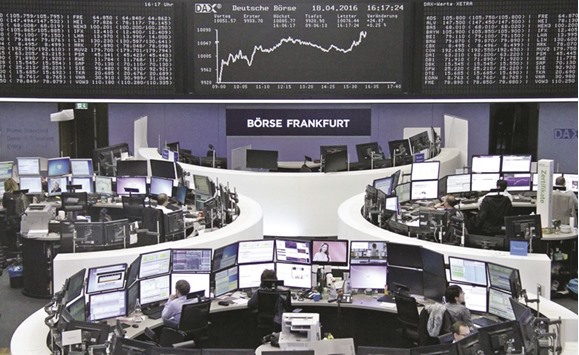European and US stocks turned moderately higher yesterday despite oil prices slipping after the world’s top producers failed to reach a deal on freezing output in weekend talks in Doha.
Frankfurt, London and Paris all initially followed on from Asia’s losses to shed more than 1.0% in opening deals, but reversed to finish the session in positive territory.
London’s FTSE 100 was UP 0.2% at 6,353.52 points; Frankfurt’s DAX 30 rose 0.7% at 10,120.31, while Paris’s CAC 40 edged up 0.3% at 4,506.84. The EURO STOXX 50 was up 0.5% at 3,069.24.
US stocks had likewise opened lower after the much-anticipated talks on Sunday in Doha between Opec and non-Opec crude producers to cap production ended without a deal.
However shares on Wall Street also swiftly reversed direction as, analysts said the Doha talks’ collapse had not battered oil prices as badly as feared.
Shortly before 1600 GMT, US benchmark West Texas Intermediate for delivery in May sank $0.58 to $39.78 per barrel. Brent crude for June delivery lost 17 cents at $42.93.
Sheraz Mian of Zacks Investment Research said he did not see the Doha failure as “a precursor for oil prices heading towards a fresh low for the year”.
“The key question on the supply side of the oil equation is the evolving production trend from US oil fields and other non-Opec basins like the North Sea,” he said in a note.
Investors initially seemed disappointed after top producers failed to reach a deal to cap output, fanning fresh fears over a supply glut that has long plagued the market.
“Equities and oil have more or less traded in lockstep in 2016, so the failure of Doha talks at the weekend and the resulting weakness in the price of oil are unlikely to be taken well by the market as a new week of trading begins,” said Russ Mould, investment director at brokerage AJ Bell.
Opec’s leading member Saudi Arabia insisted at the discussions that it would not agree to freeze production without the participation of fellow member Iran, which boycotted the talks.
While key producer Iran had said it was unwilling to freeze output —having just resumed exports after years of Western sanctions — there had been hopes that all other majors at the talks would hammer out a deal.
But analysts also pointed to the impact of a walkout by Kuwaiti oil workers which entered its second day yesterday, slashing production.
“The pressure on the energy sector is being eased as oil prices are well off the worst levels of the day, aided by reports of an oil worker strike that is hampering production in Kuwait, possibly taking some of the sting away from the Doha disappointment,” analysts at Charles Schwab said in a note to investors.
The Doha talks news had weighed heavily also on Asian energy firms.
Earlier in the day, Hong Kong ended 0.7% lower, Shanghai closed down 1.4%, Seoul sank 0.3% and Singapore slipped 0.7%.
In Hong Kong, China’s CNOOC lost 1.6% and PetroChina was off 1.9%. Inpex in Tokyo was 3% lower.

Traders work at their desks in front of the German share price index, DAX board, at the stock exchange in Frankfurt yesterday. European stocks turned moderately higher yesterday despite oil prices slipping after the world’s top producers failed to reach a deal on freezing output in weekend talks in Doha.
